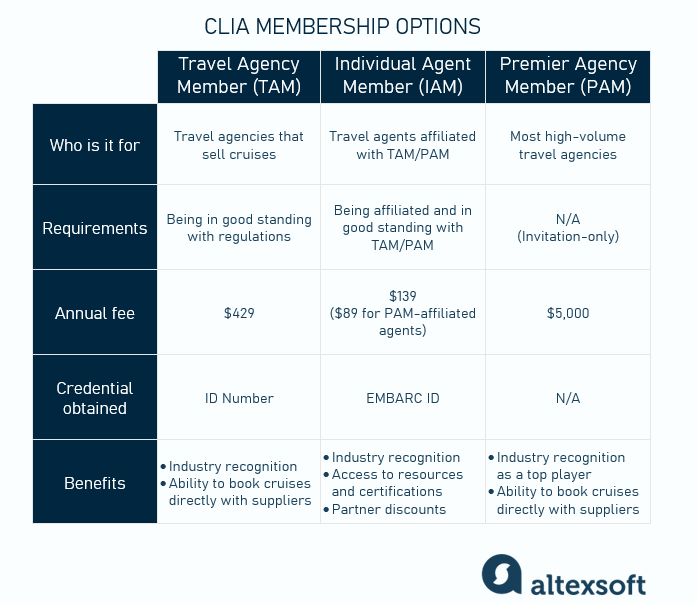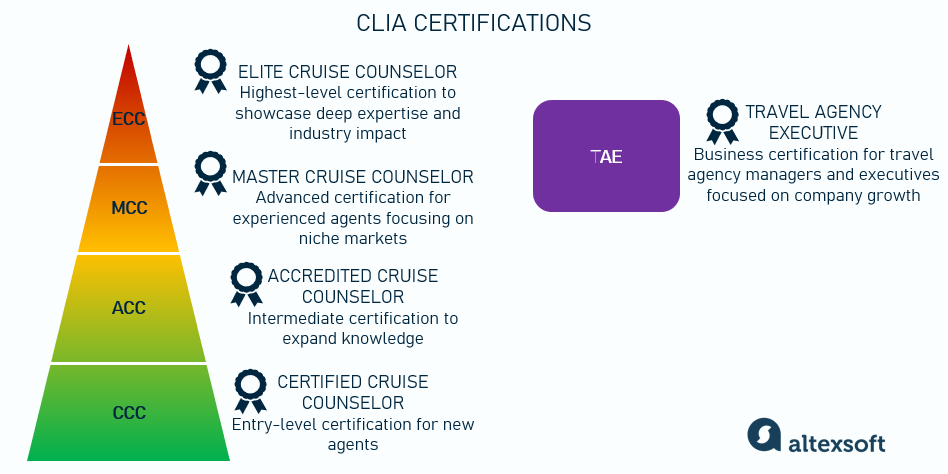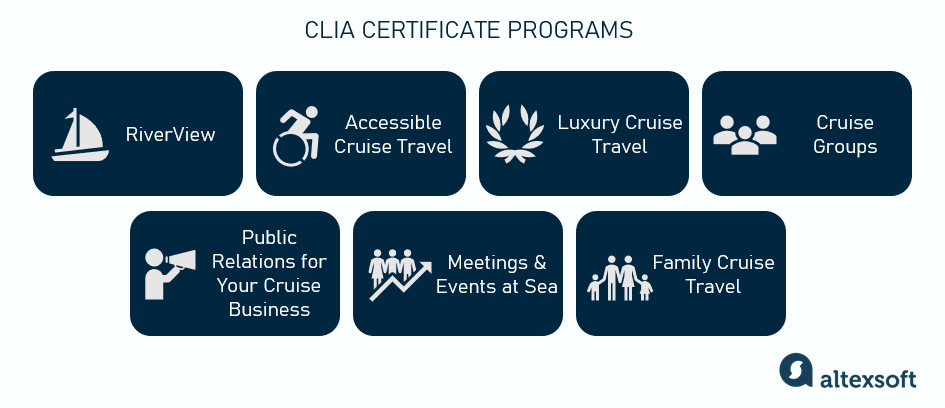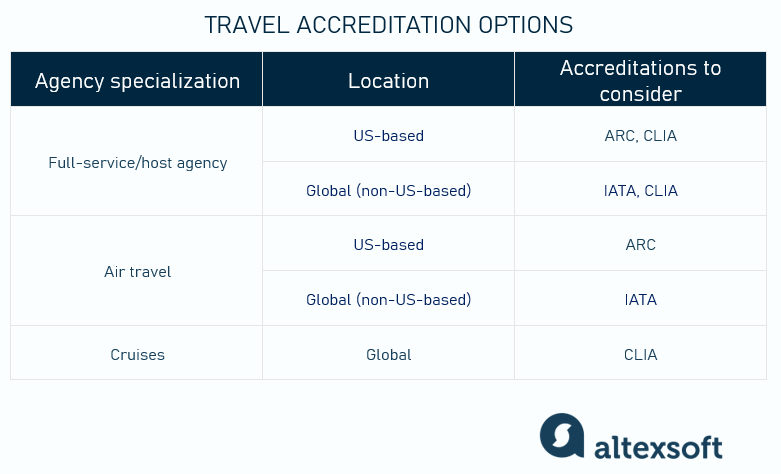The 2024 State of the Cruise Industry Report notes that, compared to other forms of travel, the cruise sector was the fastest to recover after the pandemic. It also reports that demand remains high and projects at least 10 percent growth in global cruise capacity from 2024 to 2028.
If you want to be part of that growth as a travel agent selling cruises, consider obtaining recognized industry credentials and training. In this post, we’ll explore all the available options.
But first, let’s say a few words about the main cruise industry organization, the one you’ll inevitably have to deal with – CLIA.
What is CLIA?
CLIA, or the Cruise Lines International Association, is the world's largest trade association for the cruise industry. It represents
- 50+ cruise lines worldwide that account for more than 95 percent of global cruise capacity,
- 15,000 travel agencies and 64,000 travel agents, and
- 300+ executive partners (organizations connected to cruising such as ports, airlines, hotels, etc.).
CLIA’s main goals are to advocate for the cruise industry with governments and policymakers and set standards for safety, cleanliness, and sustainability. It also provides training and resources for travel agents and promotes cruising as a vacation option.
For travel agents, CLIA has a few things to offer. Becoming a CLIA member allows you to get industry recognition and access to CLIA’s resources. Then, if you want to develop as a cruise-selling professional, you can enroll in one of its certification programs, pass the training course, and get your badge of expertise.
So let’s explore these offerings one by one.
CLIA membership
CLIA membership verifies travel agencies and agents who have expertise in selling cruise vacations and enhances their credibility in the industry. On becoming a CLIA member, you get a business identifier that establishes you as a reliable partner and cruise professional in the eyes of clients and cruise lines alike.
You might be wondering how CLIA is different from other travel accrediting entities and which credentials are right for your agency. Let’s figure it out.
CLIA membership options
CLIA has three membership options.

CLIA Memberships
TAM (Travel Agency Member) is for travel agencies that want to book directly with CLIA-affiliated cruise lines. TAM’s CLIA Industry ID Number gives access to CLIA educational and marketing materials.
IAM (Individual Agent Member) is for agents who are affiliated with current Travel or Premier Agency Members and want to build a professional identity in the cruise industry.
With IAM, you get a CLIA Enrolled Member Benefit And Recognition Credential (EMBARC ID) that grants industry recognition and provides access to CLIA educational resources and other perks.
PAM (Premium Agency Member) is for high-volume agencies. This exclusive tier grants additional premium benefits, including enhanced support and top recognition in the industry. It’s an elite group of less than 30 agencies and works on an invitation-only basis, so there’s no way you can sneak in unless you’re a really big cheese.
How to get CLIA Travel Agency Membership (TAM)?
Travel Agency Membership is a way to go if you’re a host agency or a cruise-focused travel agency.
Eligibility. TAM eligibility requirements are pretty straightforward: You must be a travel agency in good standing with state and federal regulations. That basically means that your business follows all the regulations and laws that apply to it. This includes paying taxes, filing necessary paperwork on time, and meeting requirements set by the government or industry to operate legally and fairly.
As simple as that.
Application. To apply, just fill in and submit an online form with all the basic agency information (contact details, website, etc.). Then CLIA will guide you through the remaining steps, including signing an attestation form confirming compliance with travel agency regulations.
Fees. You must also pay a TAM membership fee which is $429 annually. Note that TAM includes one Individual Agent Membership (IAM) for yourself or an affiliated agent (at a value of $139).
For another $19.99, you can be listed on CLIA’s online Agent Finder to promote your agency as a reliable and informed cruise-focused travel entity.
Result. You’ll receive your TAM CLIA Number in 4-8 weeks. Then, you’ll be able to book directly with CLIA cruise lines (like Carnival, Norwegian, or Disney) and share these credentials with affiliated IAM members.
Renewal. To renew your membership for another year, you just pay the fee and verify your company information.
How to get CLIA Individual Agent Membership (IAM)?
Individual Agent Membership (IAM) is for travel agents who want to access CLIA's resources, benefits, and training to enhance their cruise and travel expertise.
Eligibility. To get an IAM, you must be affiliated with a CLIA Travel Agency Member (TAM) or Premier Agency Member (PAM). In other words, you must either be employed by a travel agency or be a contractor with a host agency credentialed by CLIA.
Also, CLIA recommends that you generated at least $5,000 in agency commissions from cruise bookings during the past year. However, in practice, it’s up to your employer or host agency to support your membership application or not.
Application. To apply for an IAM, you must fill out and submit a simple online form. You can access it once you create an account with CLIA.
Fees. The annual fee for TAM-affiliated agents is $139, and for PAM-affiliated agents is $89. If you choose to be listed on CLIA’s Agent Finder, that’s another $19.99.
Result. Once CLIA approves your application, you’ll get a CLIA EMBARC ID. Note that an EMBARC ID doesn't allow you to book cruises. You must use your host agency credentials for that.
IAM gives you access to CLIA’s educational materials, resources, and certification programs. In addition, you get discounts from partners, access to industry events, and other perks.
Renewal. To maintain your IAM, you’ll have to complete and pass the free annual CLIA State of the Industry course and quiz. And pay the fee, of course.
CLIA certifications
CLIA certifications are attestations that develop and prove the personal expertise of travel agents with an active CLIA membership (IAM). These programs focus on industry knowledge, sales skills, and professionalism in the cruise sector.
So basically while membership gives you access to selling cruises and educational materials, certification proves your expertise.
CLIA Certification stages
There are 5 consecutive certification stages, each of which comes with courses, assignments, and often onboard training. Every level requires a certain number of credits to qualify.

CLIA Certifications
The CCC (Certified Cruise Counsellor) is an entry-level certification for agents new to selling cruises, covering basic knowledge and sales techniques.
After enrollment, you have 18 months to complete all the requirements. Those include
- passing quizzes for 11 basic courses that help you understand the cruise industry,
- attending Cruise360 Conferences and/or CLIA learning events (live or virtual),
- attending one ship inspection,
- doing 5 stateroom bookings with CLIA cruise lines, and
- have a personal experience of going on a cruise of at least 2 nights.
The ACC (Accredited Cruise Counsellor) is an intermediate certification that builds on the CCC with more advanced skills and practical experience. In 2 years after enrollment, you have to complete the following requirements:
- pass quizzes for CLIA online courses and live seminars,
- do one CLIA Certificate Program that’s focused on a niche market (e.g., family cruises, river cruises, etc. – we give a full list below),
- attending Cruise360 Conferences and/or CLIA learning events (live or virtual),
- achieve the Travel Institute’s CTA designation and Association of Canadian Travel Agencies (ACTA) CTC designation,
- attend 5 ship inspections,
- do 20 stateroom bookings with CLIA cruise lines, and
- have a personal experience of going on two cruises of at least 2 nights.
The MCC (Master Cruise Counsellor) is an advanced-level certification for experienced agents. The requirements for an MCC are similar, though they include more courses, ship inspections, bookings, etc.
The ECC (Elite Cruise Counsellor) is the highest level of individual certification, emphasizing expert-level specialization.
Besides the educational and practical requirements we talked about before, this certification includes more advanced skills such as knowledge of business aspects (marketing, customer relationships, etc.) and demonstrating industry impact activity.
The TAE (Travel Agency Executive) certification is designed for travel agency owners, managers, or executives. It focuses on equipping leaders in the travel industry with advanced skills in managing and growing their agencies effectively.
The ACC, MCC, and ECC Certifications require you to take Certificate Programs that focus on one of the niche cruise markets. Let’s explore them in more detail.
Certificate Programs for niche knowledge
CLIA Certificate Programs are courses that help travel agents expand their knowledge of travel and cruises so they can grow their client base and boost sales. Taking these training programs is a part of earning credits for the certifications we described above. Here’s what CLIA offers.

CLIA Certificate Programs
RiverView Certificate Program is all about river cruising, teaching agents about top river cruise lines and destinations and how to match clients with the right river cruise experience.
Accessible Cruise Travel Certificate Program will help you plan cruises for clients with disabilities or special needs, covering accessibility features and cruise line resources.
Luxury Cruise Travel Certificate Program teaches about premium cruise lines, high-end amenities, and how to cater to affluent travelers.
Cruise Groups Certificate Program instructs on how to market and manage group cruise bookings, including weddings, reunions, or themed cruises, for higher sales and commissions.
Public Relations for Your Cruise Business Certificate Program focuses on PR strategies for promoting cruise businesses and covers media relations, brand-building, and effective communication techniques.
Meetings & Events at Sea Certificate Program is for those who want to organize corporate events, meetings, or incentive trips on cruise ships. The core topics are logistics, ship features, and business opportunities.
Family Cruise Travel Certificate Program provides insights into family-centric cruising, highlighting kid-friendly cruise lines, activities, and features to meet the needs of multigenerational travelers.
See Also
CLIA vs IATA/ARC accreditation: Which one do you need?
There are many travel industry accreditation programs and it’s easy to get confused. But all of them serve distinct purposes for travel professionals. To wrap up, let’s say a few words about options to consider.

Which travel accreditation to choose
CLIA focuses on the cruise industry, offering certifications, training, and access to handy resources and marketing tools. Technically, it isn’t an accrediting organization, but it’s still the only industry-recognized credential program. So CLIA is ideal for travel agents specializing in or expanding into cruise travel.
However, it doesn’t give you air ticketing power. So if you want to sell flights, you need an IATA (International Air Transport Association) or ARC (Airlines Reporting Corporation) accreditation.
In a nutshell, IATA accreditation provides global recognition and the ability to issue airline tickets via the IATA BSP system. ARC serves a similar purpose but caters to US-based travel agencies.
So if you are a travel agent focusing on flights or running a full-service agency, you’ll benefit most from IATA or ARC accreditation, while cruise specialists prioritize CLIA membership.
If you mostly sell hotels, amusement park tickets, guided tours, or other travel products, you don’t need a special accreditation for that. Skip the paperwork and just keep packaging the fun.
We also have a detailed post explaining all types of travel agency accreditations that you can visit for more information.

Maria is a curious researcher, passionate about discovering how technologies change the world. She started her career in logistics but has dedicated the last five years to exploring travel tech, large travel businesses, and product management best practices.
Want to write an article for our blog? Read our requirements and guidelines to become a contributor.

